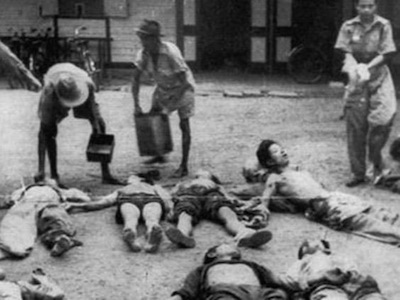
In a ruling closely watched in the north of Ireland, relatives of innocent Malayans slain by British troops in 1948 have lost their fight for an inquiry, even though the British courts have admitted that mass murder occurred.
The Supreme Court ruled on Wednesday that the appeal brought by relatives of the 23 men killed in the Batang Kali massacre would not be upheld.
The Malayan Emergency was fought from 1948 to 1960 in what is modern-day Malaysia between Commonwealth armed forces, including thousands of British troops, and anti-colonial guerrillas. Britain’s involvement stemmed largely from British ties to tin and rubber interests which were seen as critical to its economy.
Men from the Scots Guards regiment were responsible for the attack. The long campaign by the families of the victims has spilled into another row about when cases of colonial brutality are allowed to disappear into history, which has implications for legal actions in Ireland.
John Halford, of Bindmans solicitors, representing the Batang Kali families, told the court: “On 12 December 1948, British soldiers left the bodies of 24 innocent, unarmed men riddled with bullets and the British government left their families without a credible explanation.”
He said the courts had denied the families an explanation but had acknowledged “the innocence of those killed, the failures to investigate and the ‘overwhelming’ evidence of mass murder.”
Halford said the British government has been found responsible and should now apologize, “withdraw the false account given to parliament,” and address the issue “including by funding a memorial.”
“If it does not, the blood of those killed at Batang Kali will indelibly stain the concept of British justice.”
One British veteran of the conflict also criticised the court’s response.
Walter Heaton, 84, who was sent to Malaya in 1948 with the Scots Guard sister regiment the Coldstream Guards, said there is “no run-out date on justice.”
“Murder is murder. There should [be] no limit on justice,” he said, questioning why dire conditions in the “concentration” camps used to forcibly house Malayans were not discussed more in the case.
At a prison-like facility named Kampong Coldstream, which was run by his regiment, Heaton said conditions were awful. People were only put there after being rounded up in clearance operations.
He recalled watching “kids crying as soldiers burned their food and their things,” before taking the families away to the camps.
In April, ahead of the appeal, Halford said “when six of [the soldiers] have confessed to murder, eyewitnesses remain alive and forensic tests can confirm the killings were close-range executions, the law should demand an answer from the state.”
“After all, those killed were British subjects living in a British-protected state,” he added.
But David ‘Baron’ Neuberger, president of the Supreme Court and Britain’s most senior judge, ruled the case is too old to re-open.
Neuberger conceded the “evidence that came to light” was “compelling and suggests that the killings were unlawful” but said the shootings had occurred too long before a ‘right to petition’ was recognized by British courts in 1966.
However, Darragh Mackin, a lawyer with the Belfast firm KRW Law which represented Irish victims’ organisations, said the ruling would not hamper the outcome of a number of cases currently being taken by victims of of violence and murder by the British Crown forces in Ireland.
“Whilst not being a satisfactory result for the relatives of victims of the Batang Kali massacre, the judgment does have an important impact for dealing with historic related murders in this jurisdiction. The court has held that the obligation on the British state to investigate suspicious deaths arises from the date the state granted the right of individual petition, namely 1966.
“This therefore gives rise to an obligation on the British government to undertake human rights compliant investigations into conflict-related incidents, where necessary in order to discharge its duties.”
![[Irish Republican News]](https://republican-news.org/graphics/title_gifs/rn.gif)
![[Irish Republican News]](https://republican-news.org/graphics/title_gifs/harp.gif)

